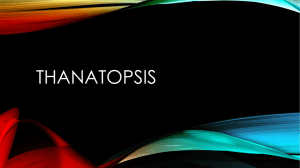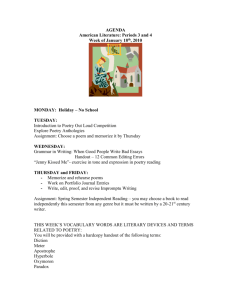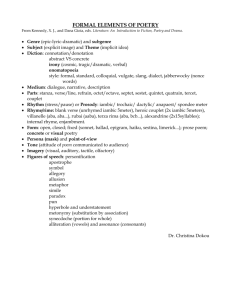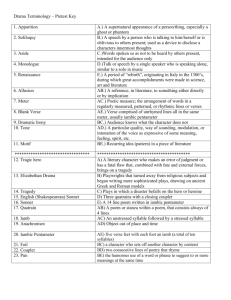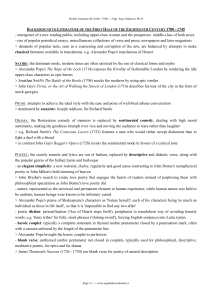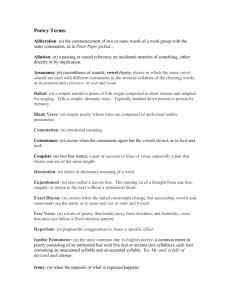Poetry Power Point
advertisement
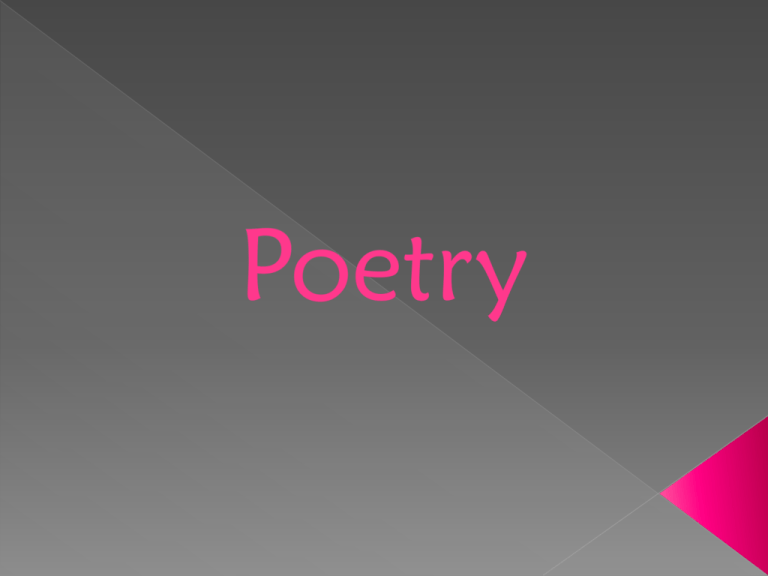
Poetry Poetry is: One of the three major genres of literature Highly concise with a musical quality. It uses emotionally charged language that usually appeals to the five senses. Types of Poetry Dramatic Poetry Poetry that uses the techniques of drama Verse that presents the speech of one or more characters Examples Include: Shakespeare’s Romeo and Juliet Euripides’ Madea Narrative Poetry o Tells a story o Because it tells a story, it is usually longer than other types of poetry Ballads A poem that tells a story They are a form of narrative poetry They are often used in songs and have a very musical quality to them No, these are not 80’s rock ballads The basic form for ballads is iambic heptameter (seven sets of unstressed, stressed syllables per line) Epic Poetry Also known as (Heroic Poetry) an epic is a long narrative about adventures of larger than life characters. Characteristics Include: •Hero is a great leader of a certain group of people •The setting includes many places, particularly supernatural realms ( ex. The land of the dead or “hell”) Group of people •. •The hero fights in a great battle or goes on a long journey or quest. Often gods or supernatural beings will take part in the action. (ex. The Odyssey, Beowulf) The Epic Hero The main character in a long narrative that reflects the values and heroic ideals of a particular society. Characteristics They possess superior physical strength o Usually a very “ethical” or moral person o Embodies the ideals of the society MODERN DAY HEROES o Modern Day Epics What themes do these epics share? Lyric Poetry A poem of highly musical verse that expresses the observations and feelings of a single speaker. Example What though, for showing truth to flattered state, Kind Hunt was shut in prison, yet has he, In his immortal spirit, been as free As the sky-searching lark, and as elate. Minion of grandeur! think you he did wait? Think you he nought but prison-walls did see, Till, so unwilling, thou unturnedst the key? Ah, no! far happier, nobler was his fate! In Spenser's halls he strayed, and bowers fair, Culling enchanted flowers; and he flew With daring Milton through the fields of air: To regions of his own his genius true Took happy flights. Who shall his fame impair When thou art dead, and all thy wretched crew? Sonnet A fourteen-line lyric poem, usually written in rhymed iambic pentameter. ? What’s Iambic Pentameter???? Iambic pentameter is among the most common metrical forms in English poetry: it is used in many of the major English poetic forms, including blank verse, the heroic couplet, and many of the traditional rhymed stanza forms. If you count, it usually has 10 syllables per line. Examples: An iambic foot is an unstressed syllable followed by a stressed syllable. We could write the rhythm like this: da DUM A line of iambic pentameter is five of these in a row: Example Here : da DUM da DUM da DUM da DUM da DUM Romeo and Juliet Examples: Notice the 10 syllables per line. JULIET appears above at a window But, soft! what light through yonder window breaks? It is the east, and Juliet is the sun. Arise, fair sun, and kill the envious moon, Who is already sick and pale with grief, That thou her maid art far more fair than she: Be not her maid, since she is envious; Her vestal livery is but sick and green And none but fools do wear it; cast it off. It is my lady, O, it is my love! Back to the Sonnet 14 lines Two types: 1.English (Shakespearian Shakespearian) 2. Italian (Petrarchan) English Sonnet consists of three quatrains (4 lines) and a couplet (2 lines) Italian Sonnet Italian consists of an octave ( 8 lines) and a sestet (6 lines). Haiku Three line verse form st rd The 1 and 3 line of the Haiku each have 5 syllables The 2nd line has 7 syllables A haiku seeks to convey a single vivid emotion by means of images of nature. Examples: Notice the syllables 5,7,5 Curving up, then down. Meeting blue sky and green earth Melding sun and rain. Blank Verse Poetry written in unrhymed iambic pentameter Popular verse form widely used by Free Verse Poetry not written in a regular rhythmical pattern, or meter it is the opposite of blank verse. Stanza • A group of lines 1. Couplet – 2 lines 2.Quatrain- 4 lines 3.Sestet- 6 lines 4.Octave- 8 lines Symbolism in Poetry Anything that stands for or represents something else. = or An object that serves as a symbol has its own meaning but it also represents something abstract. Examples in Poetry •Uses like or as to compare to two or more things •The little girl was as pretty as a flower. Metaphors- Figure of speech in which one thing is spoken of as though it were something else. Does not use like or as to make the comparison. Example: My nephews are animals. Extended Metaphor • Same as a regular metaphor but in this case a subject is spoken of or written of as though it were something else. •Several comparisons are made Figurative Language in Poetry Be prepared to see figures of speech such as similes, metaphors, personification, and onomatopoeia. Smiley face playing trumpet Literal Language You’re not listening ! Sometimes the language means exactly what it says, there are no hidden meanings or symbols. This is the opposite of Figurative Language. Hyperbole An extreme exaggeration “I’m so hungry I could eat a horse!” Uh oh ! Eat more beef!! Personification • Giving human characteristics to a nonhuman or non-living thing. “The screaming phone woke me up!” Alliteration The repetition of initial consonant sounds. Sally sells sea shells down by Listen to the sea shore. the ssssss sound The repetition of sounds at the end of words . Rhyme – When rhyming words come at the end of lines. Internal Rhyme – When rhyming words are found within a line. End Rhyme Scheme o The pattern of rhyming words in a poem o The rhyme scheme of a poem is indicated by using different letters of the alphabet for each new rhyme. Example: “My Mistress’s Eyes are Nothing Like the Sun”- Shakepeare I love to hear her speak, yet well I know A That music hath a far more pleasing sound. B I grant I never saw a goddess go: A My mistress, when she walks, treads on the ground. B And yet, by heaven, I think my love as rare C As any she belied with false compare. C Rhythm The pattern of beats, or stresses, in spoken or written language. This is very similar to the da dum da dum da dum of the iambic pentameter. “Ya’ll come back now ya hear?” THE END
